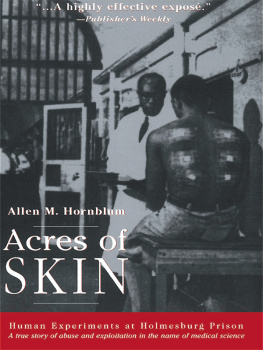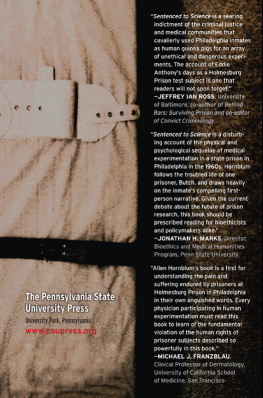Allen M. Hornblum - Acres of Skin: Human Experiments at Holmesburg Prison
Here you can read online Allen M. Hornblum - Acres of Skin: Human Experiments at Holmesburg Prison full text of the book (entire story) in english for free. Download pdf and epub, get meaning, cover and reviews about this ebook. year: 1998, publisher: Routledge, genre: Romance novel. Description of the work, (preface) as well as reviews are available. Best literature library LitArk.com created for fans of good reading and offers a wide selection of genres:
Romance novel
Science fiction
Adventure
Detective
Science
History
Home and family
Prose
Art
Politics
Computer
Non-fiction
Religion
Business
Children
Humor
Choose a favorite category and find really read worthwhile books. Enjoy immersion in the world of imagination, feel the emotions of the characters or learn something new for yourself, make an fascinating discovery.
- Book:Acres of Skin: Human Experiments at Holmesburg Prison
- Author:
- Publisher:Routledge
- Genre:
- Year:1998
- Rating:4 / 5
- Favourites:Add to favourites
- Your mark:
- 80
- 1
- 2
- 3
- 4
- 5
Acres of Skin: Human Experiments at Holmesburg Prison: summary, description and annotation
We offer to read an annotation, description, summary or preface (depends on what the author of the book "Acres of Skin: Human Experiments at Holmesburg Prison" wrote himself). If you haven't found the necessary information about the book — write in the comments, we will try to find it.
Acres of Skin: Human Experiments at Holmesburg Prison — read online for free the complete book (whole text) full work
Below is the text of the book, divided by pages. System saving the place of the last page read, allows you to conveniently read the book "Acres of Skin: Human Experiments at Holmesburg Prison" online for free, without having to search again every time where you left off. Put a bookmark, and you can go to the page where you finished reading at any time.
Font size:
Interval:
Bookmark:

A well-researched, convincing studyeffectively blends the prisoners own lurid stories with a researchers dispassionate overview.
Publishers Weekly
A devastating picture of U.S. medical experimentation and the men, educational institutions, and drug companies that carried it out.
Booklist
A thorough account of questionable medical experimentationshocking. Essential for students of medical ethics.
Library Journal
An ugly tale of outrageous abuse of prisoners at Philadelphias infamous Holmsburg prison. A seminal work.
Linn Washington, Jr., The Philadelphia Tribune
Acres of Skin is a powerful and impassioned expose of the dark side of American medicine. Most damning is Hornblums documentation of the callous indifference of prison authorities, politicians, the U.S. Military, and the so-called watchdogs of the medical profession to the hideous and dangerous experiments performed by physicians who violated their sacred oath to heal, not harm, their patients. A most important book.
Sheldon Harris, author of Factories of Death: Japanese Biological Warfare, 19321945 and the American Cover-Up (Routledge)
Painful to read, but it must be readnot only for its historical significance but also for what it can still teach us about the conduct of medical research in the contemporary world. For Allen Hornblums compelling account of what transpired within Holmsburg prison is, sadly, only a chapter in an ongoing story.
Jay Katz, Professor of Law, Medicine and Psychiatry, Yale Law School
Allen Hornblums Acres of Skin does for Holmsburg what David Rothmans Willowbrook Wars did for Willowbrook and James H. Jones Bad Blood did for Tuskegee. Each show how the authority of science has been used to effect officially sanctioned exploitation of the vulnerable. Part of the tragedy is that we must wait decades for its public exposure.
John Kleinig, Director of the Institute for Criminal Justice Ethics at the John Jay College of Criminal Justice
Routledge
New York London
Published in 1998 by
Routledge
29 West 35th Street
New York, NY 10001
This edition published in the Taylor & Francis e-Library, 2004.
Disclaimer: For copyright reasons, some images in the original version of this book are not available for inclusion in the eBook.
Published in Great Britain by
Routledge
11 New Fetter Lane
London EC4P 4EE
Copyright 1998, 1999 by Allen M.Hornblum
All rights reserved. No part of this book may be reprinted or reproduced or utilized in any form or by any electronic, mechanical, or other means, now known or hereafter invented, including photocopying and recording, or in any information storage or retrieval system without permission in writing from the publishers.
Library of Congress Cataloging-in-Publication Data
Hornblum, Allen M.
Acres of skin: human experiments at Holmesburg Prison: a true story of abuse and exploitation in the name of medical science/Allen M.Hornblum.
p. cm.
Includes bibliographical references and index.
ISBN 0-415-92336-0 (pbk.: alk. paper)
1. Holmesburg Prison. 2. Human experimentation in medicinePennsylvaniaPhiladelphia. 3. PrisonersMedical carePennsylvaniaPhiladelphia. 4. Convict laborPennsylvaniaPhiladelphia. 5. DermatologyResearchPennsylvaniaPhiladelphia. I. Title.
[R853.H8H67 1998b]
174 .28dc21 9843691
CIP
ISBN 0-203-90395-1 Master e-book ISBN
ISBN 0-203-90399-4 (Adobe eReader Format)
To My Mother
I sit on a mans back, choking him and making him carry me. And yet assure myself and others, that I am very sorry for him and wish to lighten his burden by all possible means. Except, by getting off his back.
Leo Tolstoy
- The voluntary consent of the human subject is absolutely essential. This means that the person involved should have legal capacity to give consent; should be so situated as to be able to exercise free power of choice, without the intervention of any element of force, fraud, deceit, duress, overreaching, or other ulterior form of constraint or coercion; and should have sufficient knowledge and comprehension of the elements of the subject matter involved as to enable him to make an understanding and enlightened decision. This latter element requires that before the acceptance of an affirmative decision by the experimental subject there should be made known to him the nature, duration, and purpose of the experiment; the method and means by which it is to be conducted; all inconveniences and hazards reasonably to be expected; and the effects upon his health or person which may possibly come from his participation in the experiment. The duty and responsibility for ascertaining the quality of the consent rests upon each individual who initiates, directs or engages in the experiment. It is a personal duty and responsibility which may not be delegated to another with impunity.
- The experiment should be such as to yield fruitful results for the good of society, unprocurable by other methods or means of study, and not random and unnecessary in nature.
- The experiment should be so designed and based on the results of animal experimentation and a knowledge of the natural history of the disease or other problem under study that the anticipated results will justify the performance of the experiment.
- The experiment should be so conducted as to avoid all unnecessary physical and mental suffering and injury.
- No experiment should be conducted where there is an a priori reason to believe that death or disabling injury will occur; except, perhaps, in those experiments where the experimental physicians also serve as subjects.
- The degree of risk to be taken should never exceed that determined by the humanitarian importance of the problem to be solved by the experiment.
- Proper preparations should be made and adequate facilities provided to protect the experimental subject against even remote possibilities of injury, disability, or death.
- The experiment should be conducted only by scientifically qualified persons. The highest degree of skill and care should be required through all stages of the experiment of those who conduct or engage in the experiment.
- During the course of the experiment the human subject should be at liberty to bring the experiment to an end if he has reached the physical or mental state where continuation of the experiment seems to him to be impossible.
- During the course of the experiment the scientist in charge must be prepared to terminate the experiment at any stage, if he has probable cause to believe, in the exercise of the good faith, superior skill, and careful judgement required of him, that a continuation of the experiment is likely to result in injury, disability, or death to the experimental subject.
On a sweltering September morning in 1971, I took my first apprehensive steps inside the Philadelphia Detention Center to teach an adult literacy class. The prison bustled with activity; no one seemed to be locked up. Prisonersmost of them black, dressed in light blue cotton shirts over dark navy pantsmoved in a dozen different directions, without apparent guidance or supervision. A few of the inmates displayed the same fear my eyes must have shown, but most swaggered brazenly, cursing and joking as if the steel and cinderblock facility that held them captive were just another neighborhood hangout. To a white, middle-class, 23-year-old who had just completed graduate school on Philadelphias lush and conservative Main Line, the detention center was as remote as the far side of the moon.
Font size:
Interval:
Bookmark:
Similar books «Acres of Skin: Human Experiments at Holmesburg Prison»
Look at similar books to Acres of Skin: Human Experiments at Holmesburg Prison. We have selected literature similar in name and meaning in the hope of providing readers with more options to find new, interesting, not yet read works.
Discussion, reviews of the book Acres of Skin: Human Experiments at Holmesburg Prison and just readers' own opinions. Leave your comments, write what you think about the work, its meaning or the main characters. Specify what exactly you liked and what you didn't like, and why you think so.








